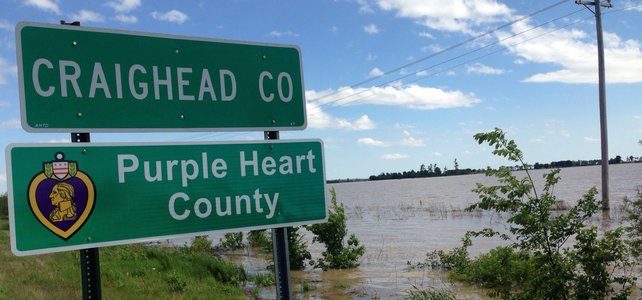Evacuations underway in Success and in eastern Pocahontas as historic floodwaters loom
by May 1, 2017 8:32 pm 1,206 views

A water wall is moving down the Black River and parts of Northeast Arkansas are bracing for the worst floods in generations. At least 300 people were evacuated from eastern Pocahontas on Monday as the river continued to rise, fueled by weekend rains in southern Missouri.
It was at 24.5-feet early in the evening in Pocahontas, but is projected to rise to 29.5-feet by Friday, according to the National Weather Service. Flood stage is 17-feet, and if the projection holds, it would eclipse the recording-setting 28.5-feet the river crested to in 2011. Pocahontas Mayor Kary Story told Talk Business & Politics each new projection for the Current River, a primary “feeder” into the Black, is higher than the last. He thinks it could easily rise above 30 feet.
“The damage this will cause will be astronomical … this will be history setting,” Story said. “At this point, we’re just trying to save as many lives and as much property as we can.”
The economic impact the flood will have on the region is incalculable at this point, Story said. During the 2011 floods, at least $500 million worth of damage was done to agricultural land in the region, according to Arkansas Farm Bureau. Hundreds of millions of dollars’ worth of damage was also done to private and public property and businesses in Northeast Arkansas. The damage began with the overflowing Black River that caused other rivers in the Mississippi River tributary system to swell and flood. Parts of Craighead, Lawrence, Jackson, Poinsett, Sharp, and other counties are already flooded, and the flooding in Randolph County will move downstream and will likely make those situations worse.
Gov. Asa Hutchinson is expected to tour the flooded areas in Sharp and Randolph counties on Tuesday (May 2). Randolph County has already been declared a state disaster area, and Hutchinson said his office will seek a federal disaster declaration for the areas impacted.
During the 2011 floods, an earthen dam in Pocahontas along the river was breached. Once the breach occurred, floodwaters poured into the countryside and raged south towards Lawrence County. U.S. 67 from Pocahontas to Walnut Ridge was shut down for more than a week. Another section connecting Pocahontas to Corning was closed. U.S. 412 and U.S. 63 near Walnut Ridge were also shutdown for several days.
U.S. 67 from Corning has already been overwhelmed with floodwaters, and the highway’s eastern Pocahontas arm will be cut from the rest of the city around noon on Tuesday when the water should creep onto the road near the McDonald’s. Once the eastern part of U.S. 67 is closed, the only major highway route to and from the Randolph County seat will be U.S. 62, which runs south to Imboden. It is also surrounded by rivers, including the Spring River, which is also in flood stage, Story said.
“The levee will fail,” Randolph County Judge David Jansen said during a noon press conference.
Water will top the levee at about 28-feet. The weight and pressure from the rushing water will quickly degrade the levee, and breaches or holes will form in the earthwork, Story said. The breaches will accelerate the water flow into the countryside.
One industry in the direct path of the floodwaters will be Peco’s recently opened poultry processing plant. The facility sits on a level plain just south of Pocahontas, but it’s not known if the plant was built above the actual flood plain. Attempts to reach Peco for comment were unsuccessful, but it has been reported the plant has told workers they will be off for the next couple of days.
Roads, homes, and businesses will be destroyed, and local government budgets will be pressed as workers are forced to work overtime to help ensure safety, Story said. In addition, as the waters spread that burden will widen too many other counties and cities. The highway closures especially along U.S. 67, a main thoroughfare connecting Dallas, Little Rock, St. Louis, and Chicago could be impossible to tabulate, officials said.
Pocahontas city employees worked feverishly Monday night to retrofit the forming Randolph County Nursing Home as a temporary shelter. A shelter was also setup in nearby Clay County in Corning. The rural town of Success had to be evacuated.
The floodwaters could not have come at a worse time for farmers, Arkansas Farm Bureau President Randy Veach said. Rice and corn crops are already in the ground, and other crops were on the verge of being planted, he said.
Talk Business & Politics contacted several farmers on Monday afternoon to gauge specific impacts and none had any comment until the flood waters actually hit. The monetary costs will be extremely high, in terms of property damage and losses, Story said. Lost days at work, sales, and other economic indicators will be hit extremely hard. The town was set to celebrate its Founder’s Day on Saturday and that will certainly be canceled. Some residents don’t want to evacuate and that is a major concern, Story said. At least three people died during the floods in 2011, and scores of residents throughout the region had to be rescued by boat.
“Right now, our number one priority is saving lives,” he said.
